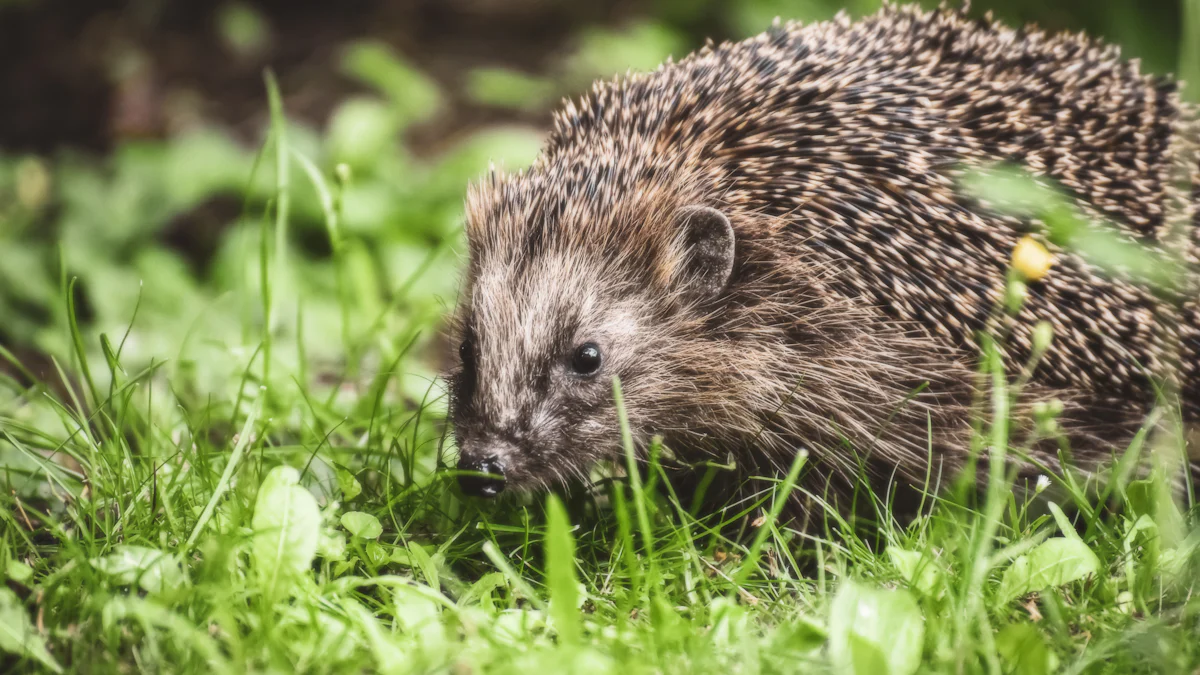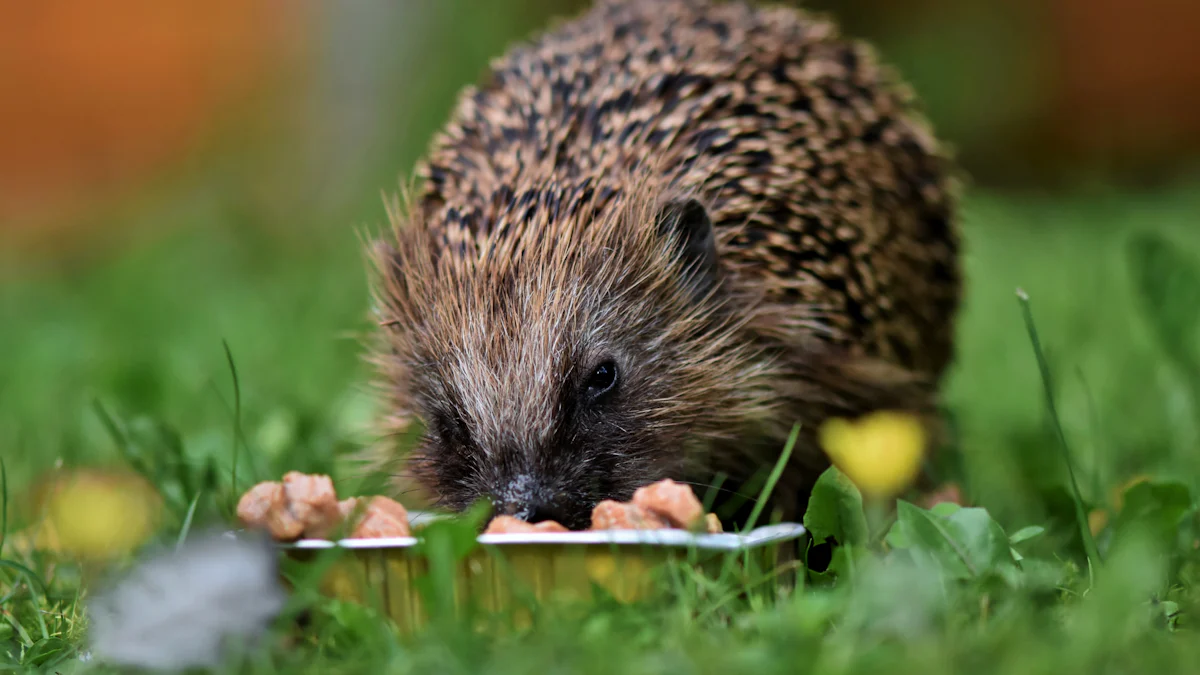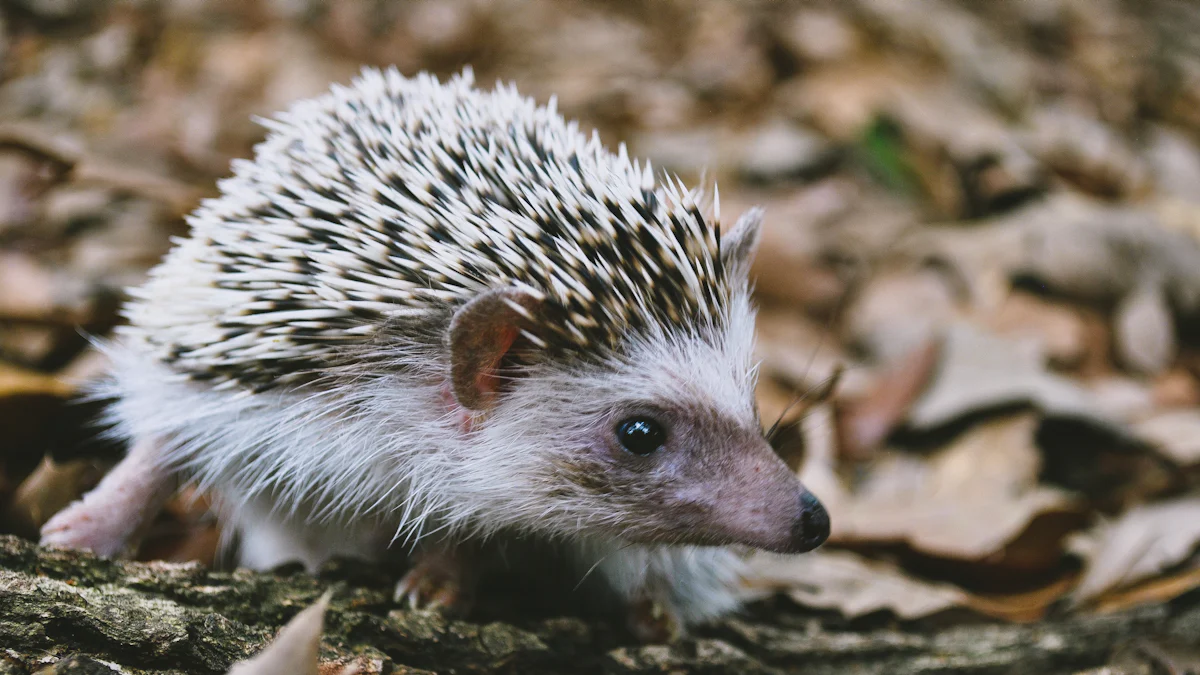
Hedgehogs are natural insectivores, and dried insects make an excellent addition to their diet. These insects provide essential nutrients like protein, fiber, and beneficial minerals that support their growth, immunity, and overall health. Among the best options, mealworms stand out for their high protein content and palatability. Many hedgehogs show excitement when offered mealworms, often choosing them first during feeding. Crickets and black soldier fly larvae also bring unique benefits, such as chitin for digestion and a balanced calcium-to-phosphorus ratio. Dried insects for hedgehogs are not only nutritious but also convenient and cost-effective for pet owners.
Key Takeaways
- Dried insects like mealworms, crickets, black soldier fly larvae, and silkworms are excellent sources of protein and essential nutrients for hedgehogs.
- Mealworms are particularly favored by hedgehogs for their taste and high protein content, making them a staple in their diet.
- Crickets provide beneficial chitin for digestion and can be used to encourage natural foraging behavior, enhancing your hedgehog’s mental stimulation.
- Black soldier fly larvae offer a superior calcium-to-phosphorus ratio, crucial for bone health, making them a great addition to your hedgehog’s diet.
- Silkworms are rich in essential fatty acids and vitamins, contributing to a shiny coat and overall health, while also being easy to store.
- Proper storage of dried insects is essential; keep them in a cool, dry place and use airtight containers to maintain freshness.
- Insects should make up about 10% of your hedgehog’s diet, so balance them with high-quality kibble and fresh foods for optimal nutrition.
The Best Dried Insects for Hedgehogs

Mealworms
Mealworms are a top choice when it comes to dried insects for hedgehogs. These small, crunchy treats are packed with high-quality protein, making them an excellent source of energy and essential nutrients. Hedgehogs often show a strong preference for mealworms, eagerly picking them out first during feeding time. Their natural flavor and texture seem to appeal to hedgehogs’ instincts, making mealtime more enjoyable.
Beyond their palatability, mealworms offer practical benefits for you as a pet owner. They are easy to store, have a long shelf life, and don’t require refrigeration. This makes them a convenient option for maintaining a steady supply of nutritious food. Additionally, mealworms are rich in beneficial minerals like phosphorus, which supports bone health. However, it’s important to balance their calcium-to-phosphorus ratio by pairing them with other insects or supplements to avoid potential health issues.
Crickets
Crickets are another fantastic option for hedgehogs. These insects are not only nutritious but also provide a good amount of chitin, a type of fiber that aids in digestion. Crickets are slightly less fatty than mealworms, making them a great choice if you’re looking to diversify your hedgehog’s diet while managing their weight.
Dried crickets are lightweight and easy to handle, which simplifies feeding and storage. They also encourage natural foraging behavior in hedgehogs. You can scatter them around your hedgehog’s enclosure to stimulate their hunting instincts, adding an element of enrichment to their daily routine. Crickets are a versatile and valuable addition to any hedgehog’s diet.
Black Soldier Fly Larvae
Black soldier fly larvae stand out as a nutritional powerhouse among dried insects for hedgehogs. These larvae are rich in protein and have an impressive calcium-to-phosphorus ratio, which is crucial for maintaining strong bones and preventing metabolic bone disease. This makes them a superior choice compared to some other insects, such as mealworms, which have a less favorable ratio.
In addition to their nutritional benefits, black soldier fly larvae are environmentally friendly. They are sustainably farmed and require fewer resources to produce, making them an eco-conscious option for pet owners. Their slightly nutty flavor and crunchy texture are well-received by hedgehogs, ensuring they enjoy every bite. Including black soldier fly larvae in your hedgehog’s diet can provide balanced nutrition while supporting sustainable practices.
Silkworms
Silkworms are an exceptional choice when it comes to dried insects for hedgehogs. These unique insects pack a punch with their high protein content, making them a fantastic energy source for your hedgehog. They also contain essential fatty acids, vitamins, and minerals that contribute to your pet’s overall health. If you’re looking to add variety to your hedgehog’s diet, silkworms are a great option.
One standout feature of silkworms is their impressive calcium levels. Calcium plays a vital role in maintaining strong bones and preventing health issues like metabolic bone disease. By including silkworms in your hedgehog’s diet, you can help ensure they get the nutrients they need for a healthy and active life. Plus, silkworms are naturally crunchy, which many hedgehogs find irresistible.
While silkworms are highly nutritious, they do have a distinct smell that some pet owners might notice. However, this doesn’t seem to bother hedgehogs at all. In fact, their natural flavor and texture often make them a favorite treat. You can use silkworms as a reward or mix them with other dried insects to create a balanced and exciting meal for your hedgehog.
Silkworms are also easy to store and have a long shelf life, making them a convenient option for you. They don’t require refrigeration, so you can keep them on hand without worrying about spoilage. This makes them a practical addition to your hedgehog’s diet, especially if you’re looking for a reliable and nutritious food source.
By incorporating silkworms into your hedgehog’s diet, you’re not only providing them with essential nutrients but also enhancing their mealtime experience. These dried insects for hedgehogs are a valuable addition to any feeding routine, offering both health benefits and enrichment.
Nutritional Benefits of Dried Insects for Hedgehogs
High Protein Content
Protein plays a vital role in your hedgehog’s health. It supports muscle development, energy levels, and overall growth. Dried insects for hedgehogs, such as mealworms, crickets, and black soldier fly larvae, are excellent sources of high-quality protein. These insects provide a concentrated dose of this essential nutrient, making them a perfect addition to your hedgehog’s diet.
Mealworms, for example, are particularly rich in protein. Hedgehogs often show excitement when offered mealworms, eagerly munching on them during feeding time. Crickets also deliver a solid protein boost while being slightly lower in fat, which can help maintain a balanced diet. Including these insects ensures your hedgehog gets the energy they need to stay active and healthy.
Calcium to Phosphorus Ratio
The balance of calcium and phosphorus is crucial for your hedgehog’s bone health. An improper ratio can lead to issues like metabolic bone disease. Black soldier fly larvae stand out in this regard, offering an ideal calcium-to-phosphorus ratio that supports strong bones and prevents deficiencies. This makes them a superior choice compared to mealworms, which have a less favorable ratio.
Silkworms also contribute significantly to calcium intake. Their natural composition helps maintain your hedgehog’s skeletal strength. By including a variety of dried insects in your hedgehog’s diet, you can ensure they receive the right balance of nutrients to support their overall well-being.
Additional Nutrients and Their Role
Dried insects provide more than just protein and calcium. They are packed with other essential nutrients that benefit your hedgehog. For instance, crickets contain chitin, a type of fiber that aids digestion and promotes gut health. This makes them a valuable addition to your hedgehog’s feeding routine.
Silkworms offer essential fatty acids and vitamins that contribute to a shiny coat and healthy skin. Black soldier fly larvae are rich in beneficial minerals like magnesium and potassium, which support various bodily functions. These insects also provide taurine, an amino acid that plays a role in heart and eye health.
By incorporating a mix of dried insects into your hedgehog’s diet, you can provide a well-rounded nutritional profile. This variety not only keeps your hedgehog healthy but also makes mealtime more enjoyable for them.
How Dried Insects for Hedgehogs Enhance Enrichment

Dried insects for hedgehogs do more than just provide nutrition. They also play a key role in enriching your hedgehog’s daily life. By incorporating these insects into their routine, you can encourage natural behaviors and keep your pet mentally and physically active.
Encouraging Natural Foraging Behavior
Hedgehogs are natural foragers. In the wild, they spend much of their time searching for food. You can replicate this behavior at home by using dried insects as part of their feeding routine. Scatter mealworms or crickets around their enclosure to create a mini scavenger hunt. This simple activity taps into their instincts and makes mealtime more exciting.
One hedgehog owner shared how hiding treats in different spots encouraged their pet to move around more. “Hiding treats in different places for your hedgehog to search for is an excellent way to encourage exercise,” they said. This approach not only keeps your hedgehog engaged but also promotes physical activity, which is essential for their health.
Crickets, in particular, are great for this purpose. Their lightweight texture makes them easy to handle and scatter. Plus, hedgehogs love hunting for them. As one pet enthusiast noted, “Most hedgehogs love hunting for crickets.” By adding this element of fun, you’re giving your hedgehog a chance to explore and stay active.
Promoting Physical and Mental Stimulation
Dried insects also provide mental stimulation. Searching for hidden treats or chasing scattered insects challenges your hedgehog’s mind. This kind of enrichment keeps them sharp and prevents boredom. A bored hedgehog may become lethargic or develop unhealthy habits, so keeping their environment engaging is crucial.
Physical stimulation is another benefit. Activities like foraging or digging for insects encourage movement, helping your hedgehog stay fit. Mealworms, with their appealing flavor and crunch, often motivate hedgehogs to actively seek them out. One pet owner shared, “My son’s hedgehog just loved each tasty treat. She eagerly ate the bugs, and they’ve become a staple in her food pantry.” This enthusiasm shows how dried insects can make feeding time both enjoyable and beneficial.
By combining nutrition with enrichment, dried insects for hedgehogs offer a well-rounded way to care for your pet. Whether it’s encouraging natural foraging or promoting physical and mental stimulation, these insects enhance your hedgehog’s quality of life.
Storage, Preparation, and Feeding Tips for Dried Insects
Properly storing, preparing, and feeding dried insects ensures your hedgehog gets the most out of these nutritious treats. Let’s explore how you can handle dried insects for hedgehogs effectively.
Proper Storage Techniques
Storing dried insects correctly keeps them fresh and safe for your hedgehog. Always check the packaging for specific storage instructions. Most dried insects come in resealable bags or containers, which help maintain their quality. Keep them in a cool, dry place away from direct sunlight and moisture. This prevents spoilage and keeps pests away.
If you buy in bulk, consider transferring the insects to airtight containers. This method helps preserve their crunchiness and flavor. Some pet owners even use vacuum-sealed bags for long-term storage. Avoid refrigeration unless the product label suggests it, as moisture can ruin the texture and quality of the insects.
Preparation Methods
Dried insects are ready to use straight from the package, but you can enhance their appeal with a few simple steps. Rehydrating dried insects is a great option if your hedgehog prefers softer textures. Soak them in warm water for a few minutes before serving. This also adds hydration to your hedgehog’s diet, which is especially helpful if they don’t drink much water.
Mixing dried insects with other foods can create a balanced meal. Combine them with high-quality hedgehog kibble or fresh fruits and vegetables. This variety keeps mealtime interesting and ensures your hedgehog gets a range of nutrients. For picky eaters, sprinkling a few dried insects on top of their regular food can encourage them to eat.
Feeding Guidelines and Recommendations
When feeding dried insects, moderation is key. Hedgehogs are insectivores by nature, so insects should make up about 10% of their diet. Overfeeding can lead to imbalances, especially if the insects are high in fat. Mealworms, for example, are a favorite among hedgehogs but should be offered in controlled amounts due to their fat content.
Offer a mix of insects to provide a variety of nutrients. Black soldier fly larvae are excellent for calcium, while crickets add fiber through their chitin content. Silkworms contribute essential fatty acids and vitamins. Rotating these options keeps your hedgehog’s diet diverse and nutritionally complete.
Scatter dried insects around your hedgehog’s enclosure to encourage natural foraging behavior. This not only makes feeding time fun but also promotes physical activity. Always supervise your hedgehog during feeding to ensure they eat safely and don’t choke on larger pieces.
Avoid feeding a straight insect diet. While insects are nutritious, they don’t meet all of your hedgehog’s dietary needs. Pair them with other food sources to create a balanced diet. If you’re unsure about portion sizes or specific insects, consult your veterinarian for personalized advice.
Dried insects like mealworms, crickets, black soldier fly larvae, and silkworms are fantastic additions to your hedgehog’s diet. They deliver essential nutrients like protein, calcium, and fiber, which support your pet’s health and natural behaviors. These insects also make feeding time more enriching by encouraging foraging and mental stimulation. To ensure safety and quality, always buy dried insects for hedgehogs from trusted suppliers. Proper storage and preparation are key to maintaining their freshness. For personalized advice on portion sizes or specific dietary needs, consult your veterinarian. Your hedgehog deserves the best!
FAQ
How do you know dried insects are safe for hedgehogs?
To ensure the safety of dried insects for your hedgehog, always purchase them from trusted suppliers. Avoid collecting insects from the wild, as they may carry parasites or pesticides harmful to your pet. Reputable sources provide insects that have been raised in clean environments and fed nutritious diets, such as fresh vegetables, fruits, and gut-loading mixtures. For added peace of mind, you can download guides to track insect nutritional values, storage tips, and feeding recommendations.
What percentage of a hedgehog’s diet should insects make up?
Insects should make up at least 10% of your hedgehog’s overall diet. This ensures they receive the essential nutrients insects provide, like protein and calcium, without overloading their diet with fats. Balance is key, so pair insects with high-quality hedgehog kibble and occasional fresh fruits or vegetables.
Can you feed wild-caught insects to hedgehogs?
It’s not recommended to feed wild-caught insects to your hedgehog. These insects may carry parasites, pesticides, or other harmful substances that could make your pet sick. Stick to commercially prepared dried insects, which are safe and specifically designed for pet consumption.
Why are mealworms a popular choice for hedgehogs?
Mealworms are a favorite among hedgehogs due to their high protein content and appealing taste. Many hedgehogs eagerly pick out mealworms first during feeding time, showing their preference for these crunchy treats. Mealworms are also easy to store and have a long shelf life, making them a convenient option for pet owners.
Are black soldier fly larvae better than mealworms?
Black soldier fly larvae offer a superior calcium-to-phosphorus ratio compared to mealworms, making them an excellent choice for supporting bone health. While mealworms are rich in protein, their phosphorus levels require careful balancing with other foods. Including both in your hedgehog’s diet provides variety and ensures a well-rounded nutritional profile.
How can dried insects enhance my hedgehog’s enrichment?
Dried insects encourage natural foraging behavior, which keeps your hedgehog mentally and physically active. Scattering insects like crickets or mealworms around their enclosure creates a fun scavenger hunt. This activity taps into their instincts and adds excitement to mealtime.
Should you rehydrate dried insects before feeding?
Rehydrating dried insects is optional but can be beneficial if your hedgehog prefers softer textures. Soaking them in warm water for a few minutes makes them easier to chew and adds hydration to your pet’s diet. This step is especially helpful for hedgehogs that don’t drink much water.
How should you store dried insects?
Store dried insects in a cool, dry place away from sunlight and moisture. Most come in resealable bags or containers, which help maintain freshness. For bulk purchases, transfer the insects to airtight containers to preserve their quality. Avoid refrigeration unless the packaging specifically recommends it.
Can you mix dried insects with other foods?
Yes, mixing dried insects with other foods is a great way to create a balanced meal. Combine them with hedgehog kibble or fresh fruits and vegetables to provide a variety of nutrients. This approach also keeps mealtime interesting for your hedgehog.
What’s the best way to feed dried insects to hedgehogs?
Offer dried insects in moderation, as part of a varied diet. Scatter them around the enclosure to encourage foraging or mix them with other foods. Always supervise your hedgehog during feeding to ensure they eat safely. If you’re unsure about portion sizes or specific insects, consult your veterinarian for guidance.


